- Graduate Programs
- Teaching
- Master Program
- Welcome to Berlin
- Information for Current Students
- Web Links
- Scholarships
- Testimonials of the Graduate Program
Pre-Doc fellows (cohort 2025)
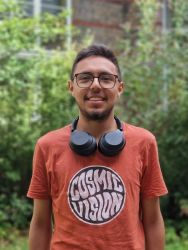
Andres
“I'm fascinated by how mathematics can model nature, capturing complex dynamics through elegant equations. In neuroscience, these models, like a ‘digital twin,’ allow us to simulate behaviors or conditions and even move toward clinical interventions and treatments. “
Can you briefly describe your professional background (BSc, MSc, research projects, etc.)?
My name is Andres Cadena, my background is in biomedical engineering, with both bachelor's and master's degrees. I was working in the mathematical and computational biology research group at the University of Los Andes in Colombia, where I also served as a teaching assistant for a course on biomedical systems modeling. My research spans biophysical modeling, from neurons (particularly spinal cord interneurons using conductance-based models) to biological oscillators in genetic circuits. I also worked on EEG data acquisition and processing for a project studying the neural correlates of mindfulness and mind-wandering states.
Why did you apply for the BCCN Berlin Pre Doc Internship?
I wanted to continue working in computational neuroscience, and Berlin is very attractive in the neuroscience field. It seemed like a great place to connect both professionally and personally. The Bernstein Center is well known for its excellence in computational neuroscience, and this internship offered a unique opportunity to deepen my research skills while connecting with a stimulating environment. Its interdisciplinary nature and global academic connections were particularly appealing, making it a key hub for exploring potential PhD opportunities within the Bernstein network or in Berlin generally.
Could you briefly describe the project you’re working on and who you’re working with at BCCN?
I'm part of the Neural Information Processing Group under Professor Klaus Obermayer. For the project I’m being supervised by Georg Reich and our project uses mean field theory to construct a whole-brain model where each brain region is represented as a node using a neural mass model. The goal is to replicate observed dynamic states during slow-wave sleep from empirical datasets, implementing cutting-edge computational modeling tools like simulation-based inference methods. This research is relevant for studying memory consolidation dynamics.
What do you like most about your current research topic?
I'm fascinated by how mathematics can model nature, capturing complex dynamics through elegant equations. In neuroscience, multiple perspectives help us understand parts of the brain's intricate dynamics and their applications. This framework, now popularly called "digital twins," involves creating computational models that allow us to simulate behaviors or conditions and propose clinical interventions, such as treatments or surgical procedures.
What are your plans after the Pre Doc internship?
After the internship, I'll return to Colombia for a break to spend time with my family (and skip winter!). During that time, I plan to apply for PhD positions in computational neuroscience, ideally in Berlin. My long-term goal is to remain in academia and contribute to developing highly realistic models for precision medicine.
What are you enjoying most during your internship at BCCN Berlin?
The most rewarding aspects are the intellectually challenging environment and engaging with brilliant peers, everyone from master's students to PhD candidates, professors, and administrative staff excel in their expertise and other areas. I've also enjoyed attending inspiring lectures and talks.
What do you like to do in your free time in Berlin?
I love biking throughout Berlin’s neighborhoods, exploring nearby cities, and immersing myself in local culture and history. Sometimes I escape for day trips to small German towns. And occasionally, I just relax with a currywurst while enjoying beautiful summer sunsets.
Have you experienced any culture shock moments?
Absolutely! Apparently, you're expected to bring your own birthday cake and pay for your guests' dinner, also celebrating early is considered bad luck. In Colombia, the opposite happens: friends throw surprise parties for you, treat you to meals all week, and never let you pay! And it doesn't matter if it's a day or two before.
Any other experiences or fun facts you’d like to share?
There are a lot of table tennis tables all over Berlin. I just randomly go to a park and challenge people to play, they're pretty good.
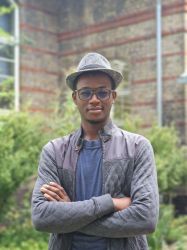
Jeffrey
“Doing brain science was a dream of mine as a kid, so I’m thrilled to now have a deeper look into how the brain works—everyday feels like solving a big jigsaw puzzle, putting new pieces together. “
Can you briefly describe your professional background (BSc, MSc, research projects, etc.)?
I was initially trained as a Telecom engineer. I had my Bachelor’s with a major in Computer Science and Networks, and my Master’s in Network Security and Information Systems. Later on, which is last year, I graduated with a 2nd Master’s in Data Science at the African Institute for Mathematical Sciences in Cameroon. For my thesis research, I explored the use Deep Learning techniques to build better models of the visual system, and this marked my first step into the world of Computational Neuroscience.
Why did you apply for the BCCN Berlin Pre Doc Internship?
After my Master’s last year, I knew I had to pursue a career in computational neuroscience. That’s when I learned about the BCCN Pre-Doc Internship. And when I saw the profiles of the PIs and the kind of research that was carried out in their labs, I knew this program would be an amazing opportunity for me to expand my knowledge and skills, and to gain solid research experience.
Could you briefly describe the project you’re working on and who you’re working with at BCCN?
I’m doing research at the FU under the supervision of Prof Cichy (also known as Radek). The project I’m working on is a study of various techniques for fusing EEG and fMRI in order to resolve human visual cognition in time and space, that is, finding out when and where neural phenomena associated with seeing and understanding visual scenes happen in the brain. More specifically, I’m interested in applying these techniques to the decoding and reconstruction of visual and semantic stimuli from brain responses.
What do you like most about your current research topic?
Doing ‘brain science’ was a dream of mine as a kid, so I’m thrilled to now be able to have a deeper look into how the brain works, and do things that I used to think of as science-fiction or futuristic . This project is not only an amazing learning experience, it’s also a constant intellectual challenge. I’m working to find patterns in neural activity and get insights into what happens up there. So it’s like solving a big jigsaw puzzle, and everyday I get to put pieces together.
What are your plans after the Pre Doc internship?
I am very happy and grateful that my supervisor was willing to keep me for an extra year after the internship. So I’ll make use of this opportunity to gain even more experience and hopefully get admitted to a PhD program.
What are you enjoying most during your internship at BCCN Berlin?
So many things. I love what I’m doing, I love what I’m learning, so much so that I feel almost no stress even when things don’t work the way they should - which is the case most of the time. I also love the environment I’m in, the people at the lab are great. And the FU campus in Dahlem is really beautiful, it’s such a pleasure to be there.
What do you like to do in your free time in Berlin?
I’m a very indoor kind of person by nature, so I don’t go out a lot. But I really love music, it’s my passion. I love listening to music and playing the piano. I was so happy to find out there is a piano at the FU Mensa, so every now and then, during breaks, I love to just go there and play in public.
Have you experienced any culture shock moments?
No, not really. Of course many things here were completely new to me when I first arrived, but I actually expected there to be such differences.
Any other experiences or fun facts you’d like to share?
I’ve been trying to learn German. It’s really challenging. I didn’t have enough time this semester, as I was focusing on my project but I’m planning on taking a German course at the FU next semester. So hopefully I’ll be able say something else than ‘Es tut mir leid, mein Deutsch ist nicht sehr gut’.
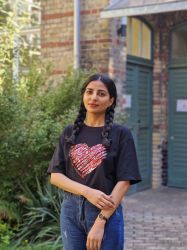
Yosra
“I see mathematics everywhere—even in nature. That’s why I love computational neuroscience: it brings together the logic of math with the mystery of the brain.”
Can you briefly describe your professional background (BSc, MSc, research projects, etc.)?
I hold a BSc and MSc in Polymer Engineering. Alongside my studies, I gained experience in bioengineering research and worked extensively with MATLAB and Python for data analysis and modeling. I’ve always been fascinated by the brain—particularly from a mathematical perspective—which led me to pursue opportunities at the intersection of biology and computation. This path ultimately guided me toward computational neuroscience.
Why did you apply for the BCCN Berlin Pre Doc Internship?
While searching for PhD positions, I came across the BCCN Pre-Doc program and felt an immediate connection. When I saw the call for applications, I was genuinely excited to discover a program that brings together two of my biggest passions: mathematics and neuroscience. It was reassuring to see that there’s a structured path for people like me who want to work at the intersection of these fields. The program not only aligned with my research goals, but also belonged to institutions with a profound scientific legacy. Humboldt University of Berlin—where Albert Einstein was a professor of theoretical physics from 1914 to 1933—had long fascinated me. Since high school, I’ve been deeply fascinated by Einstein’s theory of relativity. I remember reading about both special and general relativity and fully understanding their beauty and depth, even at that age. It wasn’t just inspiring—it felt intellectually satisfying. So being awarded a fellowship that carries his name felt incredibly meaningful to me. It gave me the sense that I was stepping into a space where I belonged—one shaped by curiosity, critical thinking, and the pursuit of understanding.
Could you briefly describe the project you’re working on and who you’re working with at BCCN?
I am working under the supervision of Dr. Silvia Viana da Silva and Dr. Matthias Haberl on a project called Tetrip. It’s a Python-based software tool for the automated detection of hippocampal sharp-wave ripples (SWRs) using 1D convolutional neural networks (CNNs). SWRs are high-frequency brain oscillations associated with memory consolidation, but due to their variability, detecting them is challenging. We use a CNN trained on raw hippocampal LFP traces, including recordings from Alzheimer’s disease models. My role is to validate predicted events and retrain the network to make the model more accurate and reliable.
What do you like most about your current research topic?
The moment I first entered the in vivo recording room and heard the electrical signals from a mouse brain using the Cheetah software—it felt almost magical. That moment stays with me. Working directly with brain data is incredibly moving. The brain is such a mysterious and beautiful system, and I feel privileged to study it. I also enjoy analyzing how parameter changes influence outcomes—a mindset I’ve nurtured over more than 20 years of playing chess. What I truly appreciate in this project is that I get to work hands-on with real, high-resolution neural data using tools like MATLAB and Python—something I had long hoped for. We’re studying hippocampal activity across different regions and experimental conditions, including Alzheimer’s disease models, which gives the research both a theoretical and translational dimension. Since SWRs are considered potential biomarkers for memory dysfunction, it’s rewarding to know that our work may one day contribute—step by step—toward better understanding and improving Alzheimer’s disease. Being part of this path feels deeply meaningful to me.
What are your plans after the Pre Doc internship?
I’d love to continue into a PhD in computational neuroscience, ideally building upon what I’ve started here. At the same time, I know that life doesn’t always follow a straight path—and that’s part of its charm. I’m open to wherever this journey leads me. As long as I’m doing science—asking questions, uncovering patterns, and following curiosity with creativity—I know I’ll be exactly where I belong.
What are you enjoying most during your internship at BCCN Berlin?
Our weekly lab meetings and journal clubs offer consistent opportunities to explore new concepts. I even joined both remotely before moving to Berlin. I particularly enjoy how these meetings introduce me to new ideas and give me keywords to chase and learn more. I love that we have real mouse brains in the lab and direct access to experimental data. The field of neuroscience is still full of unknowns, and being in a place where exploration is encouraged makes me feel energized. Everything—from the lab culture to the freedom to analyze—makes it a joy to be here.
What do you like to do in your free time in Berlin?
I enjoy walking along the Spree River, especially at sunset. I’ve been meaning to start piano lessons, since I’m passionate about music and mathematics, but haven’t managed to fit it in yet. I’d also love to spend more time in Berlin’s libraries—being surrounded by books in a quiet space is something that brings me peace and inspiration.
Have you experienced any culture shock moments?
Not really. I was already somewhat familiar with German culture. But I did find it surprising that in a city as large and vibrant as Berlin, shops close so early!
Any other experiences or fun facts you’d like to share?
I see mathematics everywhere—even in nature. Whether it’s the spirals of a sunflower, the branching of trees, the digits of π in natural shapes, or the Fibonacci sequence appearing in petals and leaves, math reveals itself all around us. That’s why I love computational neuroscience—it brings together the logic of math with the mystery of the brain. I’ve always enjoyed connecting seemingly unrelated ideas and exploring how changing one thing might influence another. Whether I’m coding, reading, or even playing chess, I’m constantly thinking in patterns.
Pre-Doc fellows (cohort 2024)
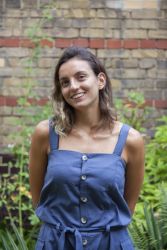
Agustina
Can you briefly describe your professional background – BSc, MSc, research projects etc.?
I hold a Licenciatura degree in Psychology (equivalent to a BSc + MSc) from Universidad Favaloro in Buenos Aires, Argentina, with a strong focus on Neuroscience. Early in my career, I joined various labs in the fields of neuropsychology and neuroscience, which provided me with hands-on experience in data collection (e.g., EEG, cognitive tasks), data analysis (e.g., MATLAB and R), scientific writing and conferences presentations. Additionally, I worked as a teaching assistant in Statistics and took several courses in mathematics and coding, tailoring my path into Computational Neuroscience.
Why did you apply for the BCCN Berlin pre-doc internship?
The BCCN Berlin Pre-Doc Internship provided the ideal intermediate step to prepare me for the next phase of my academic career. On one side, it offered a cutting-edge research environment and valuable networking opportunities that could potentiate my professional growth. On the other side, it provided a unique chance for personal development, with all the challenges that living abroad for the first time involve, fostering self-discovery and adaptability. So far, it has been an excellent, well-rounded experience.
Could you please briefly describe the project that are you working on and with whom are you working here at the BCCN Berlin?
I am working in the Computational Neurology Lab led by PD Dr. med. Christian Meisel, and also supervised by Paul Müller, at Charité – Universitätsmedizin Berlin. My project focuses on exploring the relationship between heart rate variability, epileptic seizure risk, and criticality. Specifically, I am developing machine learning models to predict brain criticality at a given moment (and thus seizure susceptibility) using peripheral measures such as heart rate variability. For this, I am analyzing long-term temporal data from intracranial EEG and ECG recordings of pre-surgical epilepsy patients.
What do you like most about your actual research topic?
Two aspects stand out to me. First, the clear clinical applicability of the project. Working in a renowned hospital allows me to see how our research can potentially have a tangible impact on patient care, which is motivating to see early in my career. Second, I like the balance between guidance and independence in my work. The environment is highly stimulating, allowing me to learn quickly while also testing my own ideas.
What are your future plans for after the Pre-Doc internship?
After the Pre-Doc Internship finishes, I will begin my PhD in Medical Science at the University of Liège (Belgium) and Forschungszentrum Jülich (Germany), where I will continue working on Computational Neuroscience. The BCCN Berlin Internship has been a crucial step in this journey, giving me the confidence to pursue a PhD in Europe and reassuring my academic goals.
What are you enjoying the most during your internship at the BCCN Berlin?
I am enjoying everything, really much. During the week, I focus on my research, attending classes, and BCCN lectures –I am learning a lot. On the weekends, I get to experience Berlin as a tourist, which provides a refreshing contrast to my work.
What do you like to do in Berlin in your free-time?
In my free time, I love exploring the city –Berlin has endless cultural activities and there is history everywhere. I like exploring the parks, lakes and the different neighborhoods, each with its own unique vibe. I also enjoy going to festivals, working out and running along the Spree at sunset. I have also made a great group of friends, and I enjoy spending time with them, especially with more experienced Berliners who help me uncover hidden gems around the city.
Have you experienced any moments of culture shock? If so, could you please briefly describe the experience(s)?
I still find it odd that everything, even shopping malls, is closed on Sundays. It took some getting used to. However, the very first thing that really surprised me was the academic clap! I did not know about this and it was quite different from what I am used to, but now I have grown to like it and even use it myself.
Any other experiences or fun facts that you want to mention?
One great experience was participating as a speaker at the BCCN Science Slam during the Lange Nacht der Wissenschaften 2024. It was a lot of fun, and the audience was really engaged. I was thrilled to win! Presenting my research in a way that was both accessible and entertaining for a general audience was challenging and exciting. It definitely pushed me out of my comfort zone, but it was totally worth it.
Additional note: Agustina has recently started her PhD position in Medical Sciences & Computational Neuroscience at Université de Liège and Forschungszentrum Jülich. Congrats!

Godwin
Can you briefly describe your professional background – BSc, MSc, research projects etc.?
I hold a bachelor's degree in Mathematics from Kwame Nkrumah University of Science and Technology (KNUST) and a master's in Mathematical Sciences from the African Institute for Mathematical Sciences (AIMS), Ghana. During my master's research, I focused on brain effective connectivity, leveraging machine learning and perturbation theory. The goal of my research was to study and understand the influence of various neural regions on one another, providing insights into how information is transmitted and processed within the brain.
Why did you apply for the BCCN Berlin pre-doc internship?
My application is driven by three key motivations. First, the unique transition platform it provides for individuals like myself, coming from a traditional mathematics background, to contribute meaningfully to neuroscience. Second, the opportunity for extensive research exposure it presents, which is crucial for shaping my future research trajectory. Lastly, the glimpse it gives to know what doctoral studies entail, to gauge and prepare for that next step. For me, this represents the perfect convergence of my aspirations and needs.
Could you please briefly describe the project that are you working on and with whom are you working here at the BCCN Berlin?
I am currently working at the QAI lab under the supervision of Professor Stefan Haufe. My project focuses on studying the analytical behaviour of time-reverse Granger causality in the presence of additive noise, using linear models. The foundation of this work is built on both analytical and numerical frameworks, to gain deeper insights into how noise influences causality detection in reverse time. Ultimately, the goal is to enhance our understanding of the robustness and limitations of Granger causality when applied to noisy data.
What do you like most about your actual research topic?
I particularly appreciate the analytical component of this work, a preference that stems from my mathematical background and I find it intellectually fulfilling.
What are your future plans for after the Pre-Doc internship?
With this experience, I look forward to continuing in academia, with the hope of pursuing a PhD to charter my research path. I look forward to deepening my expertise and contributing meaningfully to society through rigorous academic inquiry.
What are you enjoying the most during your internship at the BCCN Berlin?
The opportunity to take classes of my choice alongside the students, without restrictions, combined with the administrative support from the administration, has been incredibly meaningful to me. It fosters a sense of academic freedom and provides a supportive environment for growth and exploration.
What do you like to do in Berlin in your free-time?
I often take walks to clear my mind and have a feel of the city. Occasionally, I embark on tours to explore and appreciate the rich history both within and beyond Berlin.
Have you experienced any moments of culture shock? If so, could you please briefly describe the experience(s)?
The graffiti culture in Berlin was indeed a cultural shock for me at first, but I have come to appreciate it as an integral part of the city’s expressive fabric. I was also surprised by the concept of 'No Work Sunday,' where shops close their doors for the day, and the 'no noise period,' which typically begins after 10 PM. These were quite new to me, but they have added to my understanding of German’s unique lifestyle.
Any other experiences or fun facts that you want to mention?
I like the fact that one can attend beyond their primary field. The academic flexibility allows broaden one’s view and enriches academic experience. It is the best experience I have had.
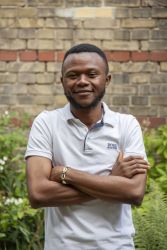
Fontaine
Can you briefly describe your professional background – BSc, MSc, research projects etc.?
I am Fontaine from Cameroon and I hold a bachelor’s degree in mathematical and computer science. I have a master’s degree in Engineering in Statistic Modeling in AIMS South Africa. During my master I worked on computer vision project titled “image segmentation model-based on recurrent neural network, reformulation of Level Set”. The project was about trying to combine the strong capability of Level Set with a recurrent neural network (RNN) to improve the segmentation of MR breast cancer images.
Why did you apply for the BCCN Berlin pre-doc internship?
During my time at AIMS I took part in the IMBIZO summer school where I met BCCN Berlin Prof. Sprekeler. After the summer school and discussions with Prof. Sprekeler I was interested in computational neuroscience topics. Then I started searching in the internet to use my computational skills and apply them to computational neuroscience questions. I found the BCCN Berlin’s pre-doc internship program and thought that this would be a great way for me to begin my journey into computational neuroscience.
Could you please briefly describe the project that are you working on and with whom are you working here at the BCCN Berlin?
I work with Matthias Haberl and Lab Silvia Viana da Silva on the project “Segmentation of Electron microscopy data set by adapting the Segment Anything Model (SAM) for 3D EM”. We are trying to use the high-robustness of the SAM to improve the automatic segmentation of mitochondria on EM images. For the next step, we are trying to extend this to multiple-class segmentation of mitochondria, membranes, nuclei, etc. If successful, this project could help to reconstruct the 3D brain.
What do you like most about your actual research topic?
I like the challenge. I like being challenged and I enjoy the way that the project is forcing me to interact with pure neuroscientists, experimentalists and the chance to collect and pre-process data myself.
What are your future plans for after the Pre-Doc internship?
PhD with my current supervisor! I want to keep going further in depth in my project, maybe writing a software to automatically segment EM images.
What are you enjoying the most during your internship at the BCCN Berlin?
Everything! Lab meetings, scientific talks, being a tourist in Berlin – not looking for flats...
What do you like to do in Berlin in your free-time?
I like to bike around the city as a tourist, I go to the movies, hang out with friends, and try lots of new cooking recipes!
Have you experienced any moments of culture shock? If so, could you please briefly describe the experience(s)?
The graffiti! In my country graffiti often means that a place is dangerous, in Berlin it’s more art. I wasn’t expecting it to be so hard to find a flat.
Any other experiences or fun facts that you want to mention?
German bread is nice :)
Pre-Doc fellows (cohort 2023)
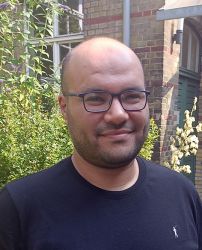
Ahmed
Can you briefly describe your professional background – BSc, MSc, research projects etc.?
I am Ahmed, from Egypt. I hold a bachelor in medicine and a master’s degree in biomedical engineering with a specialization on neural engineering. I am interested in the applications of machine learning in neuroscience research especially in neuroimaging. In my master’s thesis project, I designed an EEG classification model for motor imagery tasks using graph neural networks.
Why did you apply for the BCCN Berlin pre-doc internship?
BCCN is a well known prestigious place for computational neuroscience research, it was a perfect opportunity to join this community. Also, the program provides a great experience to prepare for a PhD in computational neuroscience.
Could you please briefly describe the project that are you working on and with whom are you working here at the BCCN Berlin?
I am working with the wonderful supervisor Livia de Hoz in her lab at CharitéCrossOver. I am working on a model for sleep stage prediction in mice from EEG, spiking activity, and the behavioral state of the mice. The aim of the model is to facilitate online experiments on mice and subsequent offline analyses.
What do you like most about your actual research topic?
The interdisciplinary nature of it and the long hours of problem solving and debugging :)
What are your future plans for after the Pre-Doc internship?
I am seeking a PhD in neuroscience mainly in cognitive computational neuroscience and neuroimaging.
What are you enjoying the most during your internship at the BCCN Berlin?
The large number of talks, lectures, and scientific events offered at BCCN. It is different to attend a talk over zoom than face to face.
What do you like to do in Berlin in your free-time?
Mainly, I walk a lot to explore the city. Especially, the lakes of the city.
Have you experienced any moments of culture shock? If so, could you please briefly describe the experience(s)?
Not precisely a cultural shock but I do really miss street cats. It is a big loss.
Additional note: Ahmed started a PhD in Michine Learning in Neuroscience and Psychiatry at FIAS (Frankfurt Institute of Applied Science). Congrats!
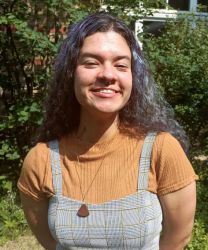
Bruna
Can you briefly describe your professional background – BSc, MSc, research projects etc.?
I graduated with a degree in Nanotechnology, specializing in Bionanotechnology, from the Federal University of Rio de Janeiro. During my undergraduate studies, I conducted research on the effects of nanoencapsulation of orange oil for the treatment of neurodegenerative diseases. This experience sparked my interest in studying the brain, which motivated me to pursue a master’s degree in Biophysics at the same university. In my master's research, I investigated a specific interaction between neurons and microglia using both in vivo and in vitro research models of Alzheimer's disease.
Why did you apply for the BCCN Berlin pre-doc internship?
Could you please briefly describe the project that are you working on and with whom are you working here at the BCCN Berlin?
What do you like most about your actual research topic?
What are your future plans for after the Pre-Doc internship?
What are you enjoying the most during your internship at the BCCN Berlin?
What do you like to do in Berlin in your free-time?
Have you experienced any moments of culture shock? If so, could you please briefly describe the experience(s)?
Any other experiences or fun facts that you want to mention?
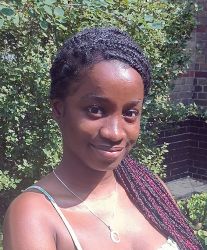
Cornell
Can you briefly describe your professional background – BSc, MSc, research projects etc.?
I hold a Bachelor of Science degree in Mathematics with Economics from the University of Cape Coast - Ghana and a Master of Science in Mathematical Sciences from the African Institute for Mathematical Sciences (AIMS) Ghana under the supervision of Dr. Philip Knight. During my Master's thesis, I developed an interest in computational neuroscience which I used to discover some hierarchical structures in the nest of cubitermes termite and that of the C elegans brain.
Why did you apply for the BCCN Berlin pre-doc internship?
Could you please briefly describe the project that are you working on and with whom are you working here at the BCCN Berlin?
What do you like most about your actual research topic?
What are your future plans for after the Pre-Doc internship?
What are you enjoying the most during your internship at the BCCN Berlin?
What do you like to do in Berlin in your free-time?
Have you experienced any moments of culture shock? If so, could you please briefly describe the experience(s)?
Any other experiences or fun facts that you want to mention?
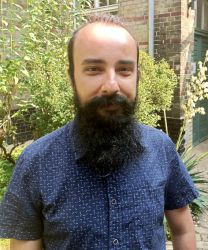
Marcelo
Can you briefly describe your professional background – BSc, MSc, research projects etc.?
I have a bachelor's degree in biotechnology/bioinformatics, one in physics, and a master’s in physics. I always worked with computational neuroscience, but recently my interest resides in the statistical physics of neuronal networks, working on mean-field theories of spiking neurons.